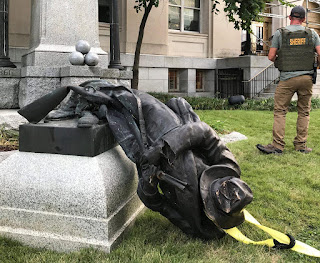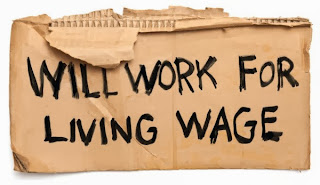




HOA forecloses on family; neighbors lose, attorneys profit
Not all the foreclosures emptying homes across the Carolinas originate from banks and lenders. Increasingly, the institution doing the foreclosing is made up of neighbors who run the homeowners association–known as the HOA.
Consider one family’s story:
Michelle Roberts’ parents helped her and her husband buy their first home in Gaston County in 2003. Even though she and her husband Darin paid the mortgage, her mom and dad signed the note. Their names are on the deed. That means her parents are on the hook now that the home is in foreclosure and the courts have ordered her family to pack up and leave this week.
“We're going to have to move back in with mom and dad for a while,” Michelle said, sitting among boxes in her living room. “We have no choice.”
This is not one more bank foreclosure–one more mortgage gone bad. No, the Roberts are losing their home to their neighbors–their HOA.
“We just wanted them to work with us,” said Michelle. “We didn't neglect paying them on purpose. They neglected to notify us.”
The Mountain View Community Association off of Spencer Mountain Road near Ranlo, North Carolina and its management company, Hawthorne Management of Charlotte, did not send a bill to the Roberts for years.
“Not one word for six years,” said Michelle, “Not one word.”
The HOA lost track of the Roberts lot and two others when the builder transferred the property to their family. Then in May of 2009 the HOA sent Michelle’s parents a statement asking for almost six years worth of dues at once–$945.
“I don’t know how we would pay that, and I don’t think it’s fair,” said Michelle’s husband Darin Roberts.
At first the Roberts say they called a neighbor who served on the board of the HOA.
“She said, ‘Don’t worry about it. We’ll work it out. It’s not that big of a deal,’” said Darin.
That was before the lien notices and threatening letters began arriving from the HOA’s law firm.
“We were blindsided,” said Michelle.
So the Roberts tried repeatedly to work out a payment plan.
“They wanted a $444-a-month payment and refused to accept anything less than that,” said Michelle.
“I had my daughter selling brownies on the weekend,” Darin said. “I borrowed from my sister. I did overtime. I’m a middle class family dude that tries to pay his bills and feed his family.”
The Roberts made payments totaling $888 last May–which sounds like they’d paid off the bulk of their original HOA debt.
“You would think wouldn’t you?” said Michelle. “You would think.”
But no.
By that point, the HOA’s attorneys were involved. And they charged far more than the original debt in fees and court costs to try to collect it all. Court records show the Roberts whole payment went to legal fees–not to the HOA.
In fact, the paralegal working for the law firm e-mailed the Roberts that, “Your account will be charged $45 for every payment plan request” even if the lawyers refused to accept the terms.
“It’s just burying us deeper and deeper,” said Michelle. “Trying to fix the problem is just making it worse. Every time they touch it, every time they pick up the phone, we’re getting billed again.”
The Roberts gave up. The HOA and its law firm foreclosed.
“Now it just seems like the HOA’s can do whatever they want anytime they want,” Darin said.
And that original bill of less than a thousand dollars? T he attorneys added almost $6,000 in court costs and legal fees.
“The people that are benefiting are the attorneys,” said Michelle. “They’re getting five times what the original bill was.”
The people who are not benefit ting from this HOA foreclosure? The neighbors. Because the foreclosure means the HOA–the neighbors–now own the Roberts home.
“I don't know what good that is,” said Michelle. “People can't sell their homes who legitimately want to sell their homes now.”
Foreclosures can drive down property values for the neighbors since would-be buyers look to comparable nearby properties – known as “comps” – to gage the price they should pay. And foreclosed homes often sell at fire-sale prices, dragging down the neighborhood average.
“The HOA will get their $975,” said Michelle. “But they’ll also have an empty house along with the others they’ve done this to.”
The I-Team searched through Gaston County Register of Deeds records and found six more foreclosures in the last year and a half in the same Mountain View neighborhood from the same Hawthorne Management company and the same law firm: Sellers, Hinshaw. (Click here to read an e-mail from Sellers, Hinshaw)
“We try to work with people,” attorney Tim Sellers told the I-Team in an earlier interview.
Sellers refused to speak on camera about Mountain View and the Roberts.
“The vast majority of the ones we deal with if they’re not in compliance we work to get ‘em in compliance,” he said.
Sellers sent the I-Team a five page time line (click here to read) detailing two years of back-and-forth with the Roberts concluding, “Collection action was authorized only when the Association received no response from the owners or after the owners defaulted on the written agreement for installment payments.”
The Roberts say they made a good faith effort to try to pay an old debt during trying times and lost their home in the process.
Sitting on her couch before loading it on the truck, Michelle summed it up: “We’re like every other family. We’re struggling. We’ve had to take three pay cuts in the banking industry just to keep a job. My business was cut in half. My father has a rare and aggressive cancer.”
Michelle’s father, Dennis Hiatt, said he may go bankrupt. Between breaths from an oxygen tank he says: “It may be legal what they’re doing but it’s just not right.”
NASCAR driver loses four year legal fight with HOA
Todd Bodine is accustomed to the sound of winning.
The NASCAR driver has won the sport’s truck series twice, most recently last year. But earlier this month, if you were to pass by the Bodines’ well-kept home in the Harris Village neighborhood of Mooresville, you would have heard the sound of Todd Bodine losing, as he and a crew of helpers tore down his prize pool house and tiki hut board by board and piece by piece, the result of an epic four-year battle with his homeowners association, or HOA.
A select committee of North Carolina lawmakers considering reforms of the HOA statutes heard that 53% of owner-occupied homes in the state are governed by HOA’s. But few of those homeowners sue their HOA and appeal all the way to the state Supreme Court, only to lose and have to tear down a structure, plus pay opposing attorneys’ fees and fines in the hundreds of thousands of dollars. The Bodines did.
“I think I’ve been done wrong,” Bodine said, sitting in shorts by his pool, the remnants of his poolside bar covered with a tarp. “And it’s incredible how unjust it is.”
The disagreement started in July of 2007 when the HOA board president who the Bodines had entertained over beers as they built their pool abruptly told them the pool house was not approved. “The president never said ‘it's OK for you to start building,’” said Keith Black, the Greensboro attorney who represented the Harris Village HOA.
Todd Bodine insists the HOA president had told him verbally to go ahead and build. “Everything was always, fine, OK, looks good,” said Bodine.
The issue came to a head at an emergency meeting in the Bodines’ driveway. Bodine was upset. “It was on then. I got in his face,” Bodine said. He and his wife went inside their home while the board members talked things over. The board members signed a “Request for Architectural Approval” checked “approved” pending the approval of the Town of Mooresville Codes Department, which the Bodines quickly secured.
But the dispute continued. The board’s attorney contends that the document was conditional on the Bodines submitting final drawings with dimensions and that the board never realized how large the structure would be. The HOA had issued interpretations of the covenants limiting the size of “accessory buildings” including tool sheds and utility buildings to 320 square feet. But the document was never recorded as part of the covenants.”They ignored the phone calls, the e-mail and built the thing,” said Black.
So when the Bodines returned home after several weeks on the road racing, they faced threatening letters and the prospect of fines from the HOA. “They were fining us $100 a day which is absurd,” said Bodine. The Bodines filed suit.
Bodine insists the HOA targeted him, knowing he could afford the fines. “I was gouged pretty hard because of who I am,” Bodine said. “I believe a lot of it was because of my celebrity as a NASCAR driver.”
But Black, the HOA’s attorney, says the lawsuit had nothing to do with Bodine’s status, further saying the HOA tried to settle. “They said, ‘No. We're not gonna do it. You're wrong. Kiss our rear end. We'll see you in court,’” said Black.
If it’s true that you can’t fight city hall, Todd and Janet Bodine found you really can’t fight the HOA. They lost at every level. It started when the trial judge gave a directed verdict to the HOA so the jurors who sat through days of testimony never even got to deliberate. “We were all dumbfounded,” said Bodine. Then the Bodines lost on appeal. And finally the state Supreme Court refused to even hear the case.
In the whole four years no one said the Bodines’ pool house hurt Harris Village. “Hell it was nice looking,” said Black. “That wasn't the issue. Nobody said it's ugly and you have to take it down.”
Instead the HOA stood on principle and said if they let the Bodines build a pool house without the permission of the HOA board – then what next? “They open the door for anybody and everybody else to say, ‘Well I want to paint my house purple and have pink toilet seats all over the front yard,’” said Black.
The Bodines say other Harris Village homeowners have broken the architectural guidelines of the HOA, so they believe the fight got personal. “I think it was a small group of people out for vengeance,” said Bodine. “They saw their cash cow and they were going for it.”
So now the Bodines are on the hook for their own attorney’s fees, the HOA’s attorneys’ fees and almost $40,000 in accrued fines. The HOA put a lien on their home for the unpaid fines. Bodine was fed up. “I told ‘em, ‘Take it. Take the house,” he said.
Having exhausted their appeals in the courts, the Bodines would like the state legislature to consider reigning in the powers of HOA’s, a group of almost 18,000 neighborhood governments in North Carolina run by neighbors. “A lot of time their power is just way too strong,” said Bodine.
Black and other attorneys representing the HOA’s say that neighbors have legal remedies built into the law and if they don’t like the way the HOA is run they can always throw out the board by electing someone else. “Anytime somebody loses all of a sudden they want it to be changed,” said Black.
But the Bodines are hardly the only homeowners to run afoul of a group of neighbors bent on tearing down their property. And the state legislature is considering several bills to reform HOA’s. None of them will help the Bodines who this month tore their pool house to the ground.
View Larger Map
Sources: McClatchy Newspapers, WCNC, Google Maps







































































.jpg)























No comments:
Post a Comment